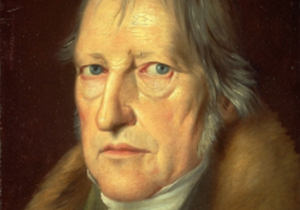Five Sayings From the Philosopher, Georg Wilhelm Friedrich Hegel

Georg Wilhelm Friedrich Hegel (1770-1831) was one of the most important philosophers of his time. As a matter of fact, his works are among the most difficult for researchers to interpret as Hegel attempted to cover as many topics as possible. However, in addition to his studies, this philosopher left behind some sayings that are well worth reflecting on. In this article, we examine five of them. You might even recognize some of them.
We shouldn’t forget to mention that Hegel is considered represent philosophical idealism. Among his most outstanding works are the Science of Logic, The Phenomenology of Spirit, Philosophy of Subjective Spirit, The Philosophy of Law, and the Encyclopedia of the Philosophical Sciences. Now, we’re going to take a look at five of the sayings of Georg Wilhelm Friedrich Hegel.

1. Only the brave make mistakes
“I have the courage to be mistaken”.
You’ve probably heard the first of Hegel’s sayings on several occasions. As a matter of fact, being wrong is unfortunately still something frowned upon by today’s society. The fear of making a mistake, of screwing up, seems to be intolerable. However, this is when you learn the most.
The General Council of Psychology of Spain (COP) states that ‘fear is not an immobile emotional state’ but feeds feared stimuli, anticipation, and self-critical thoughts. In fact, it’s a vicious cycle causing negative experiences, and persistent rumination. However, how can you escape these tendencies, and stop yourself from going round in a never-ending circle? By having the courage to make mistakes.
2. Calm always wins
“He who overcomes anger overcomes his enemies”.
This second of Hegel’s phrases allows you to reflect on the importance of learning to better manage your emotions, especially those related to anger or rage. These emotions urge you to act without thinking about the consequences. This increases the probability that you’ll end up regretting your actions.
Without calm, as Hegel indicates, it’s difficult to defeat enemies, because you lose control and, hence, all possibility of victory. Meditating, practicing mindfulness, or doing yoga are activities that can help you improve your emotional management. Of course, you could also ask for professional help.
3. To go far, you need passion
“We may affirm absolutely that nothing great in the world has been accomplished without passion”.
In this third of Georg Wilhelm Friedrich Hegel’s phrases, he addresses the subject of passion. The kind of enthusiasm that urges you to set goals that you want to achieve with gusto. Even if you hear the words, ‘you’re wrong’ or ‘that’s not going to get you anywhere’, passion is like an engine that urges you on, no matter what difficulties you experience along the way.
However, is it solely passion that you need? No, you also require discipline to carry out projects, ideas, and undertakings. Nevertheless, passion is the answer to the question that you may find yourself asking on more than one occasion. The ‘why am I doing this?’ question. In fact, if you have enthusiasm for what you’re doing you’ll have no problem in answering it.
4. The difficult decision
“Genuine tragedies in the world are not conflicts between right and wrong. They are conflicts between two rights”.
The fourth of Hegel’s sayings invites you to reflect on decision-making. Everyone knows the difference between good and evil, so choosing between these two options isn’t difficult. Whichever one you choose, you know what might happen next. However, what if the decision is between two rights?
When you choose between two possible right decisions, you have the awful fear of being wrong. Indeed, as both options are feasible, your insecurity is greater. Furthermore, if it’s an important decision, this is when you have to be even braver. Analyzing all the alternatives can help you make the right choice.

5. Wanting everything leaves you with nothing
“He who wants everything, in reality, doesn’t want anything and gets nothing”.
This last of Georg Wilhelm Friedrich Hegel’s sayings talks about greed and the desire to want everything. If you always want it all, you’re not really defining what your goal is. As a consequence, this gets you nowhere, because you don’t really know what you want.
Perhaps you should ask yourself the question, ‘what do I want?’ The answer will give you an idea of where to go, what decisions to make, where to focus… Because wanting everything, sometimes, is synonymous with emptiness.
Had you heard of Hegel before today? Do you recognize some of these phrases? As you can see, they all invite you to look inside yourself a little to reflect on different aspects that perhaps could do with a little improvement.
All cited sources were thoroughly reviewed by our team to ensure their quality, reliability, currency, and validity. The bibliography of this article was considered reliable and of academic or scientific accuracy.
- Hegel, G. W. F. (2017). Fenomenología del espíritu. Fondo de cultura económica.
- Hegel, G. W. F., & Larroyo, F. (1917). Enciclopedia de las ciencias filosóficas. Librería General de Victoriano Suárez.
- Hegel, G. W. F., & Marx, K. (1955). Filosofía del derecho (pp. 7-22). Buenos Aires: Claridad.
- Hegel, G. W. F., Mondolfo, R., & Mondolfo, R. (1968). Ciencia de la lógica. Buenos Aires: Solar.
- Martín, F. N. (2014). Lecciones sobre la filosofía del espíritu subjetivo. I. Introducciones de GWF Hegel, trad. de Ñ. de Alberto Ciria y Juan J. Padial. Cuadernos de filosofía, (63), 97-98.
This text is provided for informational purposes only and does not replace consultation with a professional. If in doubt, consult your specialist.








